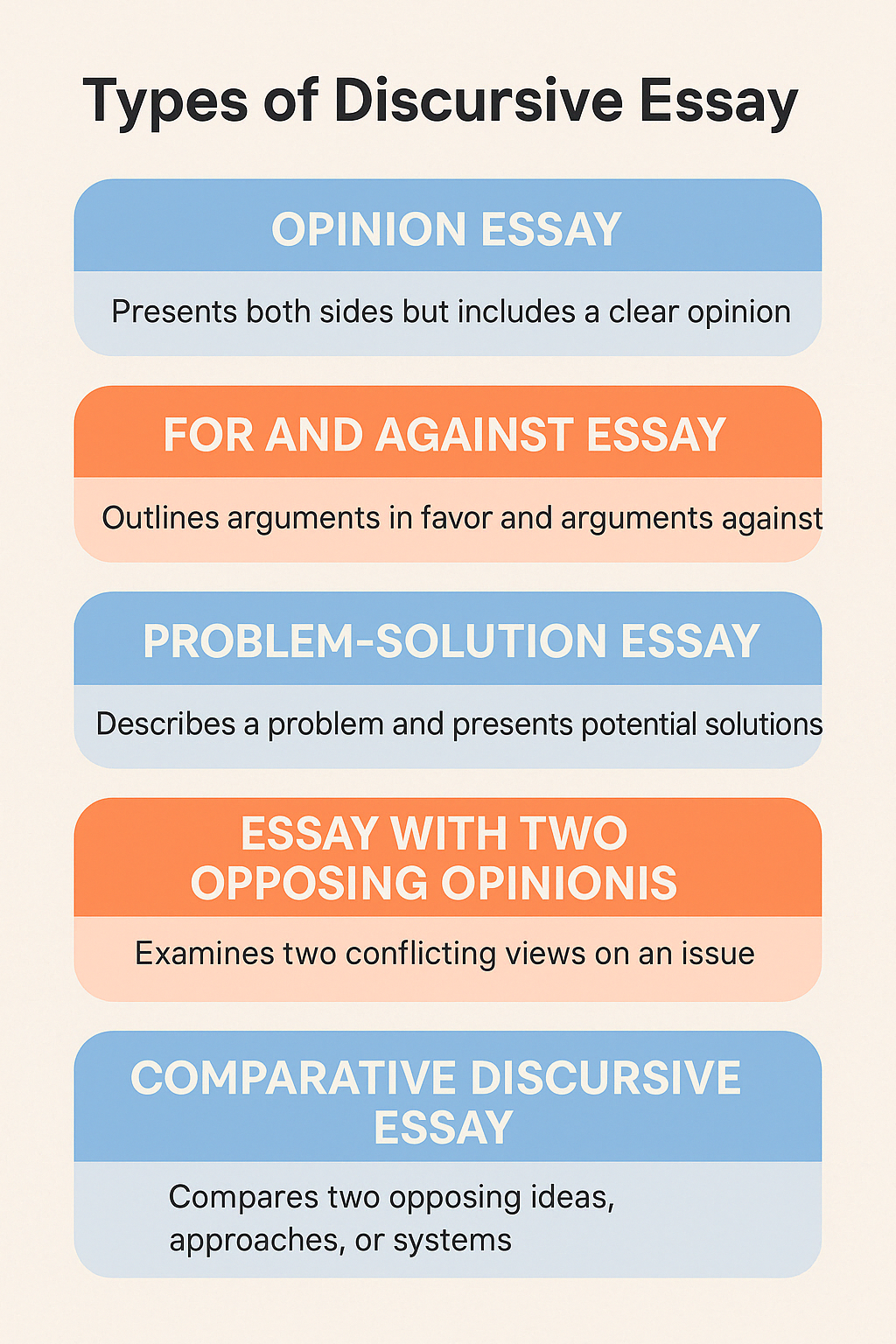Finding the best discursive essay topics can feel like trying to pick something off a massive menu. You want something that grabs attention, offers enough depth for both sides of the argument, and isn’t something every other student is writing about. In 2025, the world is packed with ongoing debates involving technology, education, climate, ethics, and social trends. Each of these gives you a chance to write something people will actually want to read.
What Is a Discursive Essay?
A discursive essay is a type of writing that discusses a topic in a balanced and objective way. Instead of pushing one opinion or trying to persuade the reader, a discursive essay explores different viewpoints and examines the arguments for and against an idea. The goal is to present the subject fairly, giving space to each perspective so the reader can form their own opinion.
This kind of essay is thoughtful and reasoned. It often deals with topics that don’t have simple answers—issues that are complex, open-ended, and can be seen from multiple angles. Discursive essays usually include:
An introduction that presents the topic
Body paragraphs that explore different sides of the issue
A conclusion that summarizes the discussion, sometimes with a personal reflection or neutral closing
They work well for subjects like education, technology, law, society, and ethics—where different beliefs and approaches exist side by side.

Types of Discursive Essay
Discursive essays aren’t all written the same way. Depending on the topic and your writing style, the structure can change slightly. Each type gives you a different way to present ideas, so knowing the difference helps you match your topic with the right format. The best discursive essay topics can fit into any of these types, but some might work better in one style than another.
1. Opinion Essay
In this format, you still present both sides, but your opinion is clear from the beginning. You’re not forcing it, just stating it and then balancing the discussion. It’s like saying, “Here’s what I think, but let’s still look at both angles.” You can support your view with examples, but you should also explain the opposite view fairly.
2. For and Against Essay
This is the most balanced and neutral format. You don’t share your personal opinion at all. Instead, you spend equal time presenting the arguments for one side, then the arguments for the other. In the end, you might sum up what each side believes, but without making a personal judgment. It’s all about letting the reader decide.
3. Problem-Solution Essay
This type focuses on an issue and offers potential solutions. You describe the problem first, then suggest ways to solve it. You can also look at the pros and cons of each solution. This format works best with topics related to policy, environment, education, or social concerns where action can be taken.
4. Essay with Two Opposing Opinions
This version takes two clear and strong opinions and examines them one after the other. You might open with a general intro, then dedicate a full section to each opinion. You break down the logic, values, and evidence behind each one. The tone should stay neutral, and you avoid choosing a winner. The goal is to help readers understand both sides without telling them which one is better.
5. Comparative Discursive Essay
In this format, you compare two ideas, approaches, or systems that are often seen as opposites. You look at their strengths, weaknesses, similarities, and differences. This type works well for topics like online learning versus classroom learning or public healthcare versus private healthcare.
Each of these styles lets you shape your essay differently depending on what the topic demands. Some are more formal, others more flexible. The best discursive essay topics will fit smoothly into one of these types, making it easier to write with structure and purpose.
How to Write a Discursive Essay
Writing a discursive essay means walking the reader through a discussion, not dragging them to a conclusion. You’re showing two or more sides of a topic and letting the facts, reasoning, and examples do the heavy lifting. The structure keeps your ideas clean and helps your argument stay focused.
Here’s a simple structure that works every time:
Basic Format for a Discursive Essay
Introduction – introduce the topic and mention that there are multiple views
First argument – one side of the issue with support or examples
Opposing argument – the other side, equally supported
Additional viewpoints – include any neutral or third perspectives if needed
Conclusion – briefly summarize and, if allowed, state your opinion in a fair tone
Use linking words to keep ideas flowing. Words like “however,” “on the other hand,” or “similarly” can help separate ideas without confusing the reader. Also, avoid extreme language or emotional phrases. This is about presenting, not convincing.
The best discursive essay topics work well with this structure because they are built for balance. They don’t lead to a single easy answer. That’s what makes them worth writing about.
How to Select the Best Discursive Essay Topics
Picking a strong topic is a big part of writing a good essay. You don’t want something too obvious or too confusing. It should raise real questions, offer clear opposing views, and feel relevant. The best discursive essay topics are the ones that people already argue about in everyday life.
Here’s a list to help you spot a good one.
Checklist for Choosing the Right Topic
Does it have at least two strong, opposing views
Is the topic current or still relevant in today’s world
Can you find examples or facts to support both sides
Is it something people care about or talk about
Are you interested enough to write 1,000+ words about it
If your topic checks those boxes, it’s probably ready for writing. Try to avoid topics that are too personal, too emotional, or too one-sided. A good topic keeps the door open to discussion—not just opinion.
You can also look at recent headlines, classroom debates, or even comment sections online. These are all places where the best discursive essay topics often pop up. If it sparks disagreement but also thoughtful conversation, it’s usually a good sign.
| Tip | Description |
|---|---|
| Understand the Purpose | A discursive essay presents multiple viewpoints on a topic, allowing readers to form their own opinions based on balanced arguments. |
| Choose a Balanced Topic | Select a subject that has clear arguments on both sides to facilitate an unbiased discussion. |
| Plan Your Structure | Organize your essay with a clear introduction, body paragraphs for each viewpoint, and a conclusion that summarizes the discussion. |
| Use Evidence | Support each argument with credible evidence to enhance the validity of your discussion. |
| Maintain Objectivity | Present each perspective fairly without showing bias, allowing readers to make informed judgments. |
| Use Clear Language | Employ straightforward and concise language to ensure your arguments are easily understood. |
| Conclude Effectively | Summarize the key points discussed without taking a definitive stance, reinforcing the balanced nature of the essay. |
150 Best Discursive Essay Topics for 2025 Writing Ideas
If you’re searching for the best discursive essay topics for 2025, this complete list gives you everything you need. These ideas are split into six useful categories so you can quickly find a topic that fits your interest. The best discursive essay topics allow you to write with balance and depth while showing more than one side of an issue. This collection works well for school, college, blogs, or even exam practice. Pick any category and get started.
Society and Culture
These topics delve into the evolving aspects of societal norms, cultural practices, and the impact of media on daily life.
Should parents monitor teenagers’ phone use to ensure safety?
Is social media harming real friendships by replacing face-to-face interactions?
Should influencers be treated as public figures with accountability?
Is traditional marriage outdated in modern society?
Does pop culture shape personal values more than family upbringing?
Should public figures share political opinions openly?
Is online activism effective in bringing about real-world change?
Should people be allowed to work remotely from any location?
Are reality shows creating unrealistic expectations among viewers?
Does fashion influence self-esteem, especially among teenagers?
Should the private lives of celebrities be respected by the media?
Are people becoming too reliant on digital communication methods?
Does fame always come with a psychological cost?
Should child stars be protected by stricter labor laws?
Is it acceptable to cancel public figures for past mistakes?
Does physical appearance affect career success in various industries?
Should local cultures be preserved in rapidly globalizing cities?
Are gender roles changing too quickly for society to adapt?
Does fast fashion do more harm than good to the environment?
Should all public spaces be monitored with surveillance cameras?
Is slang damaging the integrity of formal language?
Should religion be discussed openly in educational institutions?
Is being famous worth the pressure and loss of privacy?
Does social media boost or hurt mental health among users?
Are people judged too harshly online for their opinions?
Technology and Innovation
These topics explore the rapidly evolving landscape of technology and its implications on society.
Is artificial intelligence taking over jobs traditionally held by humans?
Should students use AI tools for studying and academic assistance?
Are self-driving cars safe for integration into urban traffic systems?
Is data privacy a lost cause in the age of digital surveillance?
Should robots replace humans in caregiving professions?
Does smart technology genuinely enhance the quality of daily life?
Should facial recognition technology be banned in public spaces?
Is cryptocurrency a secure and viable option for everyday transactions?
Are tech billionaires wielding too much influence over society?
Should children be encouraged to use tablets for educational purposes?
Are we becoming overly dependent on mobile devices for communication?
Should social media platforms require government-issued identification for account creation?
Is wearable technology more of a trend than a necessity?
Should smartphones be banned in classrooms to improve learning?
Is online shopping replacing real-life retail experiences?
Does excessive screen time negatively impact cognitive development?
Should tech companies pay for news content they share?
Are voice assistants always listening and compromising privacy?
Is cybersecurity strong enough to protect digital voting systems?
Should drones be used for deliveries in residential areas?
Is digital art considered authentic as traditional art forms?
Should online advertisements be regulated more strictly?
Does technology affect memory retention and recall abilities?
Are online relationships as meaningful as in-person ones?
Is 5G technology safe for public health concerns?
Education and School Topics
These are practical, relatable, and always open to debate. If you’re a student, these may feel closest to home.
Should schools remove letter grades
Is online learning better than classroom learning
Should homework be optional
Are school uniforms necessary
Should students choose their own subjects
Does class size affect learning
Should exams be replaced with projects
Is group work fair in schools
Are extracurriculars more helpful than homework
Should schools teach about mental health
Is college worth the debt
Should coding be a basic subject
Do students need financial education
Is detention an effective punishment
Should arts be prioritized in school
Are school lunches healthy enough
Should students evaluate teachers
Does school start too early
Is recess still important for teens
Are private schools more effective
Should students have a say in rules
Is cheating easier with tech
Should school libraries go digital
Are standardized tests outdated
Should students learn to debate

Ethics and Morality
These topics delve into complex ethical dilemmas and moral questions prevalent in today’s society.
Should animals be used in scientific research for human benefit?
Is lying ever acceptable to protect someone’s feelings or safety?
Should individuals be punished for making offensive jokes?
Is it ethical to test products on animals for consumer safety?
Should cloning be legalized for organ donation purposes?
Is euthanasia a humane option for terminally ill patients?
Should individuals have the right to sell their organs?
Is consuming meat ethical in the context of animal rights?
Can war ever be justified on moral grounds?
Is genetic editing crossing ethical boundaries in science?
Should people be allowed to live off the grid without interference?
Is privacy more important than national security concerns?
Should hate speech be banned completely to protect society?
Is it wrong to use surveillance without public consent?
Should the death penalty be legal in modern justice systems?
Are billionaires morally obligated to give back to society?
Is stealing always wrong, regardless of circumstances?
Should athletes speak out on social and political issues?
Is it acceptable to separate art from the artist’s actions?
Should laws be based on public opinion or ethical principles?
Is forgiveness always the best response to wrongdoing?
Should vaccinations be mandatory for public health?
Can money buy happiness, or is it morally irrelevant?
Is age just a number in romantic relationships?
Should individuals always tell the truth, no matter the consequences?
Politics and Law
These topics explore the intersection of governance, legal systems, and societal norms.
Should voting be mandatory to ensure democratic participation?
Is democracy always the most effective form of government?
Should prisoners have the right to vote in elections?
Should political advertisements be banned on social media platforms?
Is censorship ever acceptable in a free society?
Should immigration laws be more lenient to accommodate refugees?
Is trial by jury an outdated method of delivering justice?
Should political leaders be limited to one term in office?
Should drug laws be reformed to decriminalize certain substances?
Is lobbying harmful to fair political processes?
Should all police officers be required to wear body cameras?
Are protests the most effective way to enact social change?
Should minimum wage be standardized across all regions?
Is free speech truly protected in today’s society?
Should citizenship be granted automatically by birth?
Should prisons focus more on rehabilitation than punishment?
Is political correctness beneficial or detrimental to society?
Should wealthy nations accept more refugees?
Should the voting age be lowered to increase youth participation?
Should spreading fake news be considered a criminal offense?
Is taxing the wealthy an effective way to reduce inequality?
Should there be limits on campaign donations to prevent corruption?
Should leaders be elected solely by popular vote?
Are international sanctions an ethical tool in foreign policy?
Should whistleblowers be protected under the law?
Environment and Science
These topics address pressing environmental issues and scientific advancements affecting our world.
Should plastic bags be banned to reduce environmental pollution?
Is climate change primarily caused by human activities?
Should all vehicles transition to electric to combat pollution?
Are carbon taxes effective in reducing greenhouse gas emissions?
Should governments limit air travel to reduce carbon footprints?
Is recycling still a viable solution to waste management?
Should hunting be banned to protect endangered species?
Are zoos ethical institutions for animal conservation?
Should genetically modified foods be labeled for consumers?
Is nuclear energy a safe alternative to fossil fuels?
Should individuals be incentivized to bike instead of drive?
Is fast food contributing significantly to environmental degradation?
Should meat consumption be taxed to reduce environmental impact?
Are space exploration missions a misuse of resources?
Should oil drilling be banned to protect ecosystems?
Should single-use packaging be prohibited to reduce waste?
Is climate activism becoming too extreme in its methods?
Are electric cars truly environmentally friendly?
Should public transportation be free to encourage its use?
Is access to clean water a fundamental human right?
Should tree planting be mandatory in urban planning?
Are natural disasters increasing due to climate change?
Should tourism be limited in ecologically sensitive areas?
Should governments invest more in renewable energy research to combat climate change?
Is it ethical to use geoengineering techniques to mitigate the effects of global warming?
Final Thoughts on Selecting the Best Discursive Essay Topics
Selecting the best discursive essay topics is a crucial step in crafting compelling and thought-provoking essays. The extensive list provided here, spanning various categories such as society, technology, education, ethics, politics, and the environment, offers a wealth of ideas to inspire your writing. These topics are designed to encourage balanced arguments and critical thinking, essential components of effective discursive essays.
As you embark on your essay-writing journey, remember that a well-chosen topic not only engages your readers but also allows you to explore different perspectives and develop a nuanced understanding of the subject matter. Utilize this list as a starting point to identify issues that resonate with you and have relevance in today’s world. By selecting topics that align with your interests and the concerns of your audience, you can create essays that are both informative and impactful.
In conclusion, the best discursive essay topics are those that challenge you to think critically and articulate your thoughts clearly. Use this compilation as a resource to guide your topic selection and to inspire essays that contribute meaningfully to ongoing conversations in various fields.




